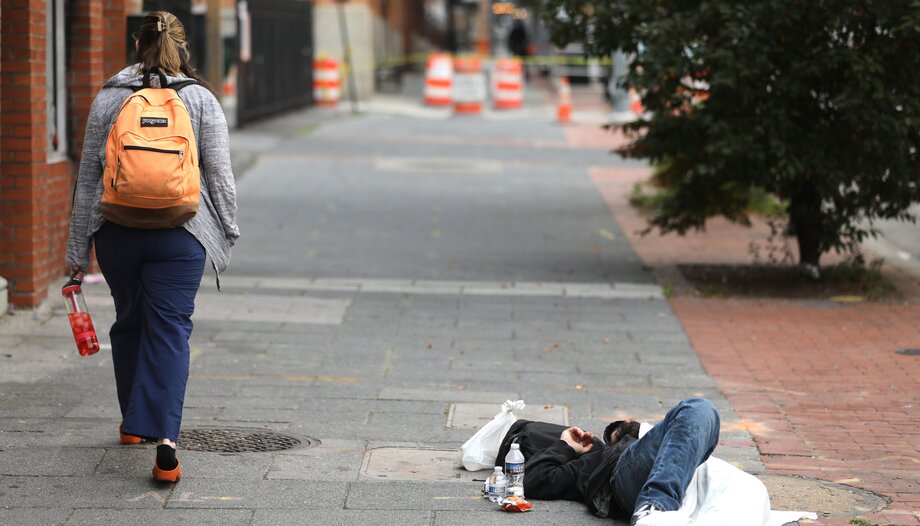According to the Homelessness Campaign 2023, "contrary to what may be thought", homelessness is "a situation in which any person can end up when several factors intersect: personal, work, family, economic...". Although he points out that this is usually the case when "the lack of a stable place to live and the lack or rupture of social ties" are combined.
The press conference was attended by Susana Martinez, president of FACIAMThe project has also helped three people who have been homeless: Manuel, a 60-year-old Spaniard, Estrella, a 19-year-old Honduran woman, and María, a 34-year-old Spaniard.
Manuel has explained that he had to stop working at the age of 40 to take care of his sick mother.
When he died and wanted to rejoin the labor market, no company wanted to hire him because they considered him "too old". There came a time when he could not pay the rent and, since there had been a breakup between his brothers, he had to live on the street, a world that "I did not know, I saw it as something far away that could not happen to me, I did not even know that there were soup kitchens, or aid, or anything".
Homelessness experiences
Exhausted from his situation, he started walking along the side of the road on a summer day, hoping that the excessive heat would kill him. However, an unforeseen event saved him: a young male nurse was walking his dog nearby, the animal escaped, went to where Manuel was lying on the ground and licked his face. Following his dog, the nurse found Manuel and was able to alert SAMUR.
Manuel, now fully recovered, is being cared for at the CEDIA 24 Hour Center.
Estrella arrived in Spain 10 months ago from Honduras. Although her father knew some friends in Madrid, after two months they told her she had to look for a room to rent. After staying at the Albergue San Juan de Dios, she is now in a youth apartment, and is preparing to become a hairdresser, because her dream is "to be able to bring my father and brother to me".
For her part, Maria, 34, was a graffiti artist, but a traffic accident and an unexpected pregnancy led her to a precarious economic situation. With no family ties, she had to ask for help, despite considering herself very strong and not wanting to do so, because she saw it as something for "poor people". During this time, she says she realized that "you can't do it alone". Thus, she came to Caritas' Santa Barbara Home for single mothers. Maria defines herself as "quite atheist", and comments that "I never thought of thanking the Church, but, to tell the truth, it has saved me. I am grateful to be able to create a bond with my daughter, and to be able to rest, I haven't rested in years.
Promote "support networks
The president of FACIAM, Susana Hernández, states that "it is necessary to make homelessness visible as a social problem, which must be tackled with public policies and measures that provide social support for the needs of people who do not have a home".
On the one hand, FACIAM seeks to "guarantee access to housing. Since there is a lack of social housing and rents are excessive", and, on the other hand, "to promote support networks", about which the president of FACIAM says: "We claim the relational component as a priority, both in the prevention of street situations and in the processes of recovery and social incorporation".
The Network proposes to "incorporate social support into intervention programs and connect people in community spaces".
Making homeless people visible
This campaign, which will be held on Sunday, October 29th, is the 31st edition of the Homeless Campaign, promoted by CaritasFACIAM (Federación de Asociaciones y Centros de Ayuda a Marginados), XaPSLL (Xarxa d'Atenciò a Persones Sense Llar de Barcelona) and besteBI (Plataforma por la Exclusión Residencial y a favor de las Personas Sin Hogar de Bilbao).
On Thursday 26th, pre-campaign events were held in different cities. In Madrid, a march was held from Callao to Ópera, where the campaign manifesto was read and a musical performance took place with the collaboration of "Musicians for Health". In addition, "in a symbolic way, a net was woven by the textile artist Concha Ortigosa, with the participation of the people of the network of attention to homeless people in the city of Madrid", according to the campaign's communiqué, "the aim is to make homeless people visible and to claim social rights that protect them, such as guaranteeing housing or promoting support links".








